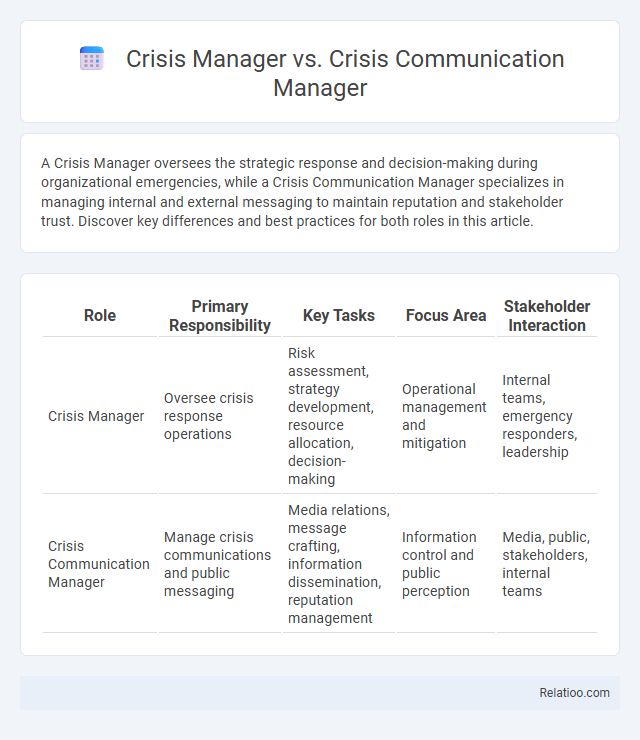A Crisis Manager oversees the strategic response and decision-making during organizational emergencies, while a Crisis Communication Manager specializes in managing internal and external messaging to maintain reputation and stakeholder trust. Discover key differences and best practices for both roles in this article.
Table of Comparison
| Role | Primary Responsibility | Key Tasks | Focus Area | Stakeholder Interaction |
|---|---|---|---|---|
| Crisis Manager | Oversee crisis response operations | Risk assessment, strategy development, resource allocation, decision-making | Operational management and mitigation | Internal teams, emergency responders, leadership |
| Crisis Communication Manager | Manage crisis communications and public messaging | Media relations, message crafting, information dissemination, reputation management | Information control and public perception | Media, public, stakeholders, internal teams |
Understanding the Roles: Crisis Manager vs Crisis Communication Manager
A Crisis Manager focuses on overseeing the entire response strategy during an emergency, ensuring operational continuity and risk mitigation. A Crisis Communication Manager specializes in managing internal and external messaging to maintain organizational reputation and provide clear information to stakeholders. Your organization benefits most when these roles collaborate, combining strategic crisis leadership with effective communication to navigate complex situations.
Core Responsibilities of a Crisis Manager
A Crisis Manager is primarily responsible for developing and implementing strategies to mitigate the impact of emergencies on an organization, coordinating response efforts, and ensuring business continuity. Unlike a Crisis Communication Manager, who focuses on managing public relations and internal communications during a crisis, the Crisis Manager handles operational decisions and resource allocation to resolve the situation effectively. Your role as a Crisis Manager demands quick decision-making, risk assessment, and collaboration with various departments to protect assets and maintain organizational stability.
Essential Duties of a Crisis Communication Manager
A Crisis Communication Manager specializes in managing your organization's messaging during emergencies, ensuring timely and accurate information dissemination to stakeholders, media, and the public. Their essential duties include developing crisis communication plans, coordinating with internal teams, crafting press releases, and monitoring media coverage to mitigate reputational damage. This role differs from a general Crisis Manager, who oversees the overall crisis response strategy, and a Crisis Manager, who focuses more broadly on operational and tactical crisis handling.
Skill Sets Required for Each Position
A Crisis Manager requires strong strategic decision-making skills, risk assessment expertise, and the ability to lead cross-functional teams under pressure. A Crisis Communication Manager specializes in media relations, message crafting, and stakeholder engagement to effectively control narratives during emergencies. The general Crisis Manager role combines operational oversight with communication skills but places greater emphasis on coordination, resource allocation, and incident resolution.
How Each Role Handles a Crisis Situation
A Crisis Manager primarily oversees strategic decision-making and resource allocation to mitigate risks and resolve crisis situations efficiently. The Crisis Communication Manager focuses on managing information dissemination, maintaining transparency, and protecting the organization's reputation through timely and clear messaging to stakeholders and the public. Meanwhile, a Crisis Manager combines operational leadership with coordination across departments to ensure cohesive crisis response and recovery processes.
Collaboration and Overlap Between the Roles
Crisis Manager, Crisis Communication Manager, and Crisis Manager roles often overlap in collaboration by ensuring coordinated strategies during high-pressure situations. The Crisis Manager oversees overall response operations and resource allocation, while the Crisis Communication Manager specializes in messaging, media relations, and stakeholder engagement to maintain public trust. Effective collaboration between these roles enhances real-time information flow, aligns crisis objectives, and mitigates reputational risks for organizations.
Training and Qualifications: What’s Needed?
Crisis Managers require comprehensive training in risk assessment, strategic planning, and leadership, often supported by certifications such as Certified Crisis Manager (CCM). Crisis Communication Managers need specialized skills in media relations, public speaking, and message crafting, with qualifications like the Accredited Business Communicator (ABC) or courses in strategic communication. Both roles benefit from practical experience in crisis scenarios, but the Crisis Manager emphasizes operational control while the Crisis Communication Manager focuses on maintaining organizational reputation through effective information dissemination.
Impact on Organizational Reputation
A Crisis Manager focuses on overall crisis resolution and operational continuity, directly mitigating risks that could damage the organizational reputation. A Crisis Communication Manager specializes in managing information dissemination, transparency, and message consistency to preserve public trust and stakeholder confidence during crises. Both roles are critical, but the Crisis Communication Manager has a more direct impact on shaping public perception and maintaining brand integrity through strategic communication.
Case Studies: Role Effectiveness in Real Crises
Case studies reveal distinct role effectiveness between Crisis Manager, Crisis Communication Manager, and general Crisis Manager in real crises. The Crisis Communication Manager excels in managing public perception and media relations, while the Crisis Manager focuses on operational decision-making and resource coordination. Understanding your specific crisis needs ensures the right expertise is applied for optimal outcomes and organizational resilience.
Choosing the Right Role for Your Organization
Crisis Manager focuses on overall incident response and recovery, ensuring business continuity and minimizing operational disruption during emergencies. Crisis Communication Manager specializes in managing internal and external messaging, safeguarding your organization's reputation through timely and strategic communication. Choosing the right role depends on whether your priority is operational control or reputation management during a crisis, aligning your organization's needs with specific expertise.

Infographic: Crisis Manager vs Crisis Communication Manager
 relatioo.com
relatioo.com